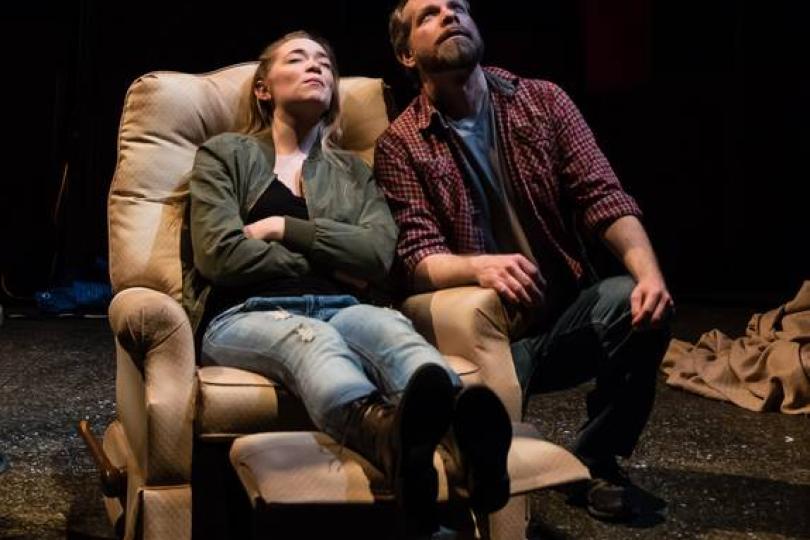Untethered

A bit untethered from its own plot and naturalistic dialogue, Pro Rata’s performance of Rocket Man is a bit more like a space oddity.
Rocket Man feels like it was written to make English, Theatre, and Philosophy majors underline every other sentence with a contemplative sigh at the deep thoughts of the author, prolific script writer Steven Dietz. Donny (Matt Wall), our protagonist, is a middle-aged land surveyor and a failed landscape architect. He opens the show by skittering around his attic and divulging Truths to the audience. By way of introduction to the play and its themes, Donny bemoans the fact that throughout his whole life he has trusted in the Pedestrian button and traffic light logic. With a flourish, he reveals a stolen Pedestrian Button that reveals the sad truth: his trust has been in vain, for there are no wires to connect the Pedestrian Button to the larger lighting systems. This useless button exists because humans, he cries, “demand the illusion of involvement,” and our world offers placating measures to fill that need. As a starting monologue, it is unearned, but helps sets the stage for the plot and its larger problems to come. See, every page or so in Rocket Man every character has such a pronouncement—a Truth that is seemingly given from on high. But because Rocket Man never gives us any reason to care about these characters or their individual plights, these declarations start to fall like so many drops of rain on an audience that is already unpleasantly soaked.
The trajectory of Rocket Man, while not entirely predictable, is populated by a few stock characters: the buffoony and mentally unstable best friend, Buck (Lanny Langston), the nagging ex-wife, Rita (Rachel Austin), the disillusioned teenaged daughter, Trisha (Anna Beth Baker), and the coworker/potential love interest who has friendzoned Donny, Louise (Shana Eisenberg). These characters buzz around Donny, seeing and talking to him, but failing to listen to him because they are too involved with themselves. At first they show moderate concern that he is trying to sell his whole life on his front lawn with the sign – “Here’s my life. Make an offer”—but they seem to get over this shock and its clear implications fairly quickly. Perhaps cleaning out his attic has made more room for their neuroses as well as Donny’s? None of them listens to each other long enough to understand that Donny’s life-shedding home cleaning is a cry for help and attention.
Austin and Eisenberg do their best with Rita and Louise, respectfully, but Dietz’ script gives them no room to breathe much life or truth into their roles. In the first half, Rita is perfunctorily shrewish without the malice that might make her more interesting (her excuse about a year of truth just feels tired to this reviewer). Eisenberg tries to lean into the pain of divorce and rejection that must lurk just under Louise’s brash exterior, but given that almost every three lines she must once again reference the fact that she doesn’t sleep, the character ends up falling flat. Langston's Buck has the most naturalistic and compassionate dialogue of the piece, but this sits poorly with the other characters and their more stilted, formal lines. While overall this works for him, it feels strange next to the rest of the cast, who appear to be trying to do the book as-is. Wall undoubtedly has the hardest job of the evening, trying to make us care about Donny’s unrealized dreams of being a landscape architect, while attempting to carve space for the audience to discover the beauty and tragedy of someone who works so closely with the earth constantly yearning for the stars. Elements of the stagecraft point to this unresolved tension as well—the many lamps littering the stage are like so many constellations. The skylight which goes to the ceiling instead of to the heavens juxtaposes the mundane uncomfortably with the vastness of space.
Act I passes predictably enough in a flurry of monologues, Deep Pronouncements, and general obtuseness on the part of the characters. Act II, however, takes a more radical turn.
Just before leaving, Donny tells his daughter Trisha that there may be other worlds where time moves in the opposite direction to how we experience it. Donny doesn’t go much further than that, but in Act II, the audience is transported to just such a mirrored world. There, our full cast of characters resumes their lives, but instead of growing older, they grow younger and younger. In this other world, their milestones become more bittersweet, yet otherwise (here I think Dietz wants us to marvel at his irony) not much changes. For Trisha, her 16th birthday means the end of her driving privileges, her last beer, and the knowledge that she will soon be embraced by the optimism and simplicity of youth (and then death); for the seemingly happily married Donny and Rita, getting younger means the loss of Rita’s beautiful wrinkles, and the knowledge that they will soon have to go on their honeymoon. Here, in this backwards world, the honeymoon is the last trip a couple make together before being carried off by their exuberance of youth. This act yields the best acting of the play, with the now matronly Trisha imploring her parents and her parents’ friends to take more risks and do more with their lives. Baker does this strange scene justice, taking care to make Trisha’s mannerisms and speech connote an old soul trapped in a vivacious form.
Rocket Man misses out on the power of a lot of speculative fiction and magical realism by constantly explaining and reinforcing things that are plainly evident to the audience throughout; we all know what the blue light cue at the end of Act I means, and we don’t really care about how Trisha “picked” her parents in this culture that grows ever younger. In an attempt to continue to spoon-feed us its larger Message, small, self-indulgent monologues by characters in the real world of Act I punctuate the activities of the alternative world of Act II. These monologues make it clear to the audience that real-world Donny has chosen to abandon them forever, and robs the reverse-world of Act II its potency. Instead of letting go of the characters in Act I or being forced to compare the pros and cons of both worlds, these monologues reinforce that we should care more about the real world of Act I, and allow the audience to belay and disregard the strangeness of this ever-reversing mirror world.
In this reviewer’s analysis, Pro Rata has done a fine job with a fairly weak script. Perhaps I am jaded, but I could have done with more showing, and less perfunctory monologuing. Perhaps, however, you will disagree. As Donny and Louise both mention, in any timeline there is a small window of opportunity to have or experience something -- once you miss the moment, it can never be recovered. Your window of time to catch this play closes soon – the last performance is on April 1 (unless you too are capable of traveling backwards in time).
Editor's Note: After discussion with the actor, we learned that Langston did not add anything to Buck's lines that were not in the script. It is a testament to how much more naturalistic his lines and Langston's characterization was. We apologize for any concern caused to Langston, whose performance was enjoyed. This article orginally implied that the actor was ad-libbing. It has been updated accordingly.




